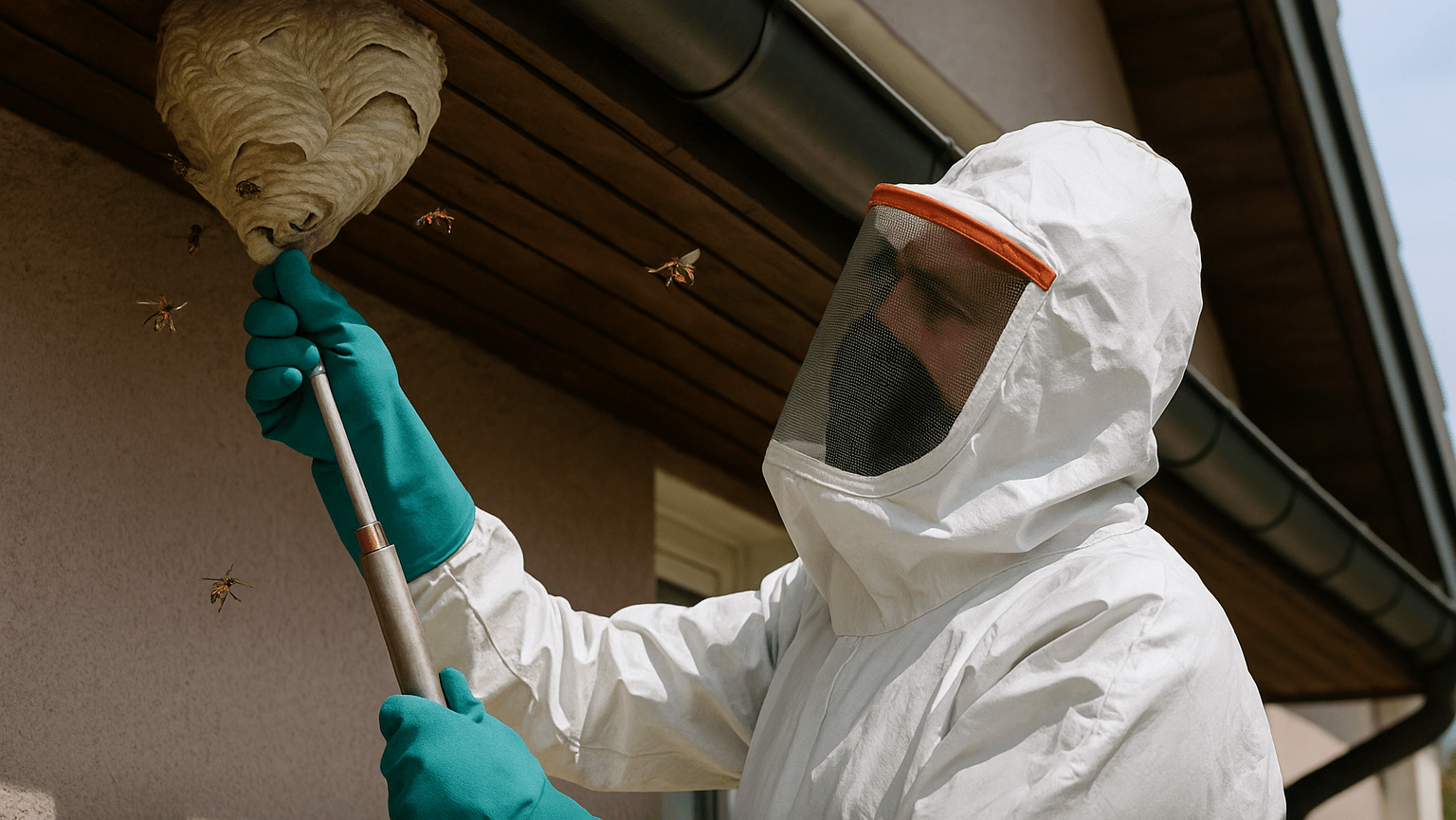Key Takeaways
- Hornets are drawn to homes by food, water, and sheltered nesting spots.
- Common attractants include trash, fallen fruit, standing water, lights, untreated wood, and strong scents.
- Prevent nests by sealing entry points, managing food waste, and using natural repellents.
- Hornet activity peaks in late summer and early fall—key times for prevention.
- Call professional pest control for safe and effective nest removal.
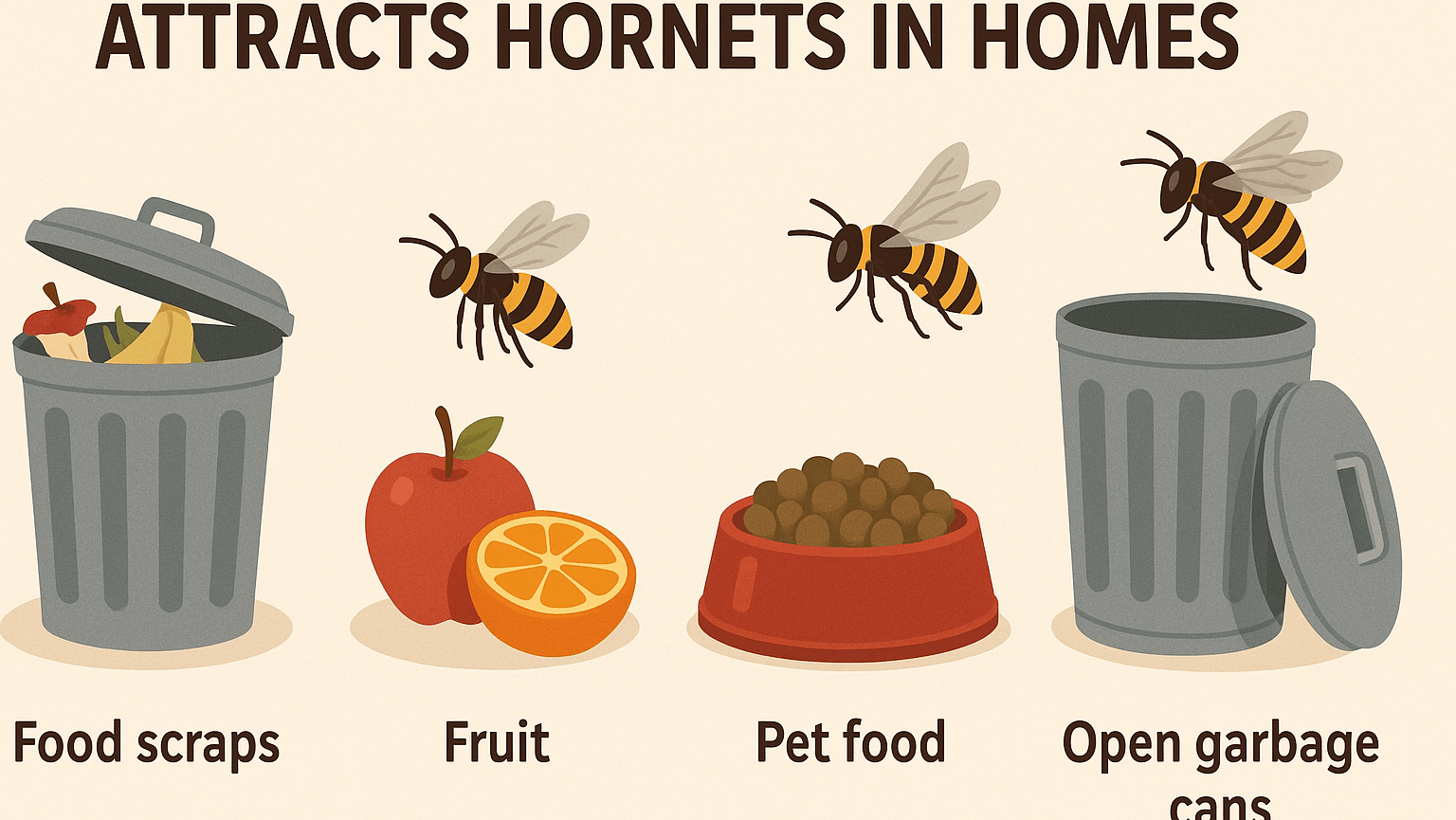 Nothing ruins a perfect summer day like hornets buzzing around your barbecue or patio, right? If you’re like most homeowners, you’ve probably wondered, “Why does my house seem like hornet central lately?” You know what? Hornets don’t pick homes randomly—there’s always a reason they’re visiting yours. Hornets are large, intimidating insects that can be dangerous if they nest close to your home.
Understanding what attracts hornets to your home is key to preventing them from settling in and creating a nest on your property. Hornets, like most insects, are driven by their need for food, water, and shelter, and your home may be providing an ideal environment for them.
This article serves as a practical guide on identifying what attracts hornets to your home, providing clear prevention tips, safe handling strategies, and advice on when professional pest control services are necessary.
If you’re noticing hornets around your home more frequently, it might be time to call in the pros. Schedule your Free Pest Inspection today, and let our experts help you identify and solve the hornet issue safely and effectively.
Nothing ruins a perfect summer day like hornets buzzing around your barbecue or patio, right? If you’re like most homeowners, you’ve probably wondered, “Why does my house seem like hornet central lately?” You know what? Hornets don’t pick homes randomly—there’s always a reason they’re visiting yours. Hornets are large, intimidating insects that can be dangerous if they nest close to your home.
Understanding what attracts hornets to your home is key to preventing them from settling in and creating a nest on your property. Hornets, like most insects, are driven by their need for food, water, and shelter, and your home may be providing an ideal environment for them.
This article serves as a practical guide on identifying what attracts hornets to your home, providing clear prevention tips, safe handling strategies, and advice on when professional pest control services are necessary.
If you’re noticing hornets around your home more frequently, it might be time to call in the pros. Schedule your Free Pest Inspection today, and let our experts help you identify and solve the hornet issue safely and effectively.
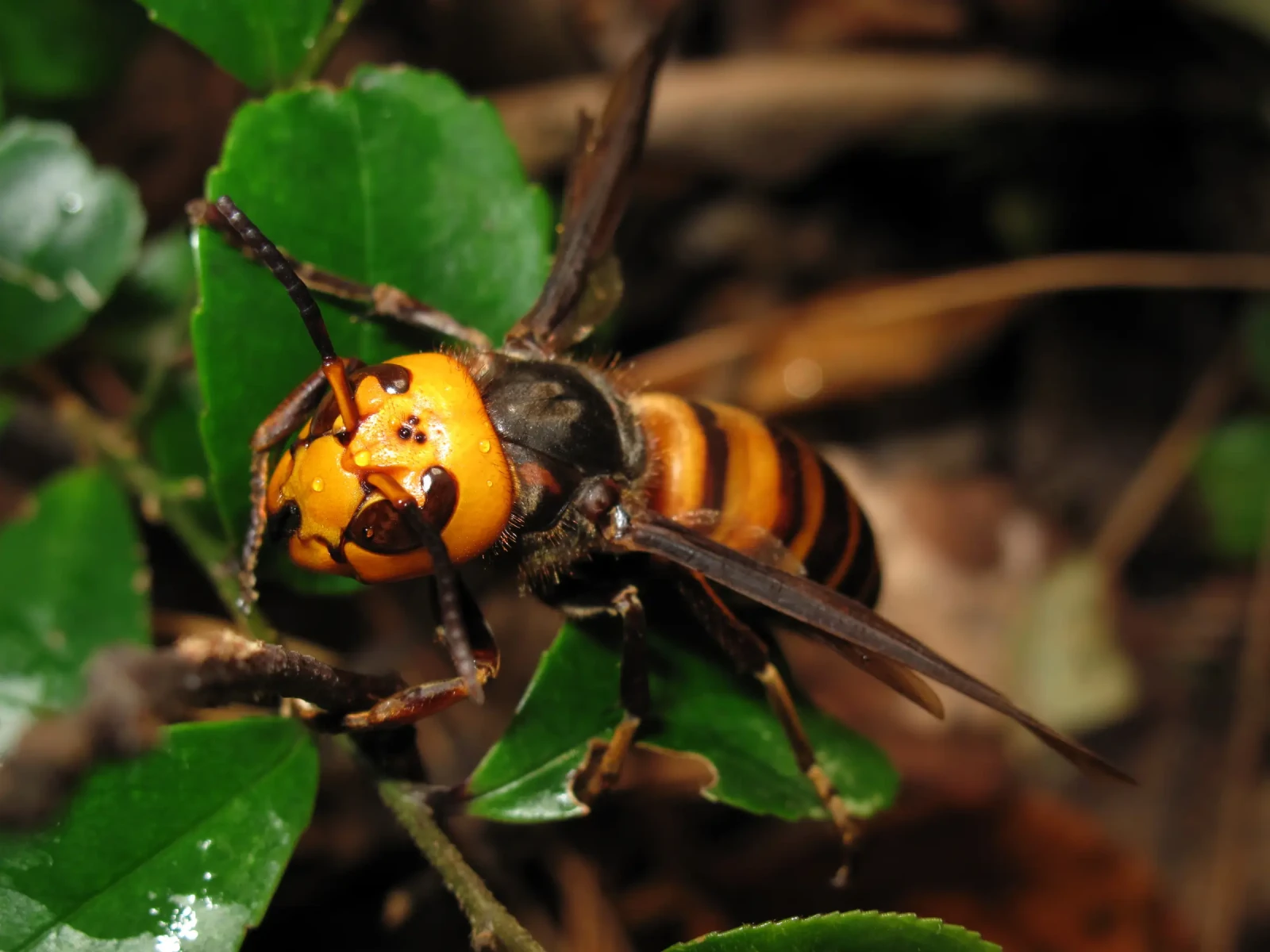

Not getting a solution?
Get your free pest control estimate today!What Do Hornets Like?
Hornets, like us, have pretty simple needs—food, water, shelter, and a safe place to set up a family. Hornets are opportunistic feeders and nest builders, attracted to environments that offer food, water, and shelter. Homes with easy access to these resources become prime real estate in the hornet world. They are drawn to sweet foods such as ripe fruit, soda, and desserts, as well as protein-rich sources like meat and fish, often scavenging at picnics, barbecues, or trash bins. Anything sugary—soda spills, ripe fruits, desserts, or picnic leftovers—is like a neon sign inviting hornets to a feast. Water is another essential for hornets, making standing water, birdbaths, or leaky faucets appealing to them. For nesting, hornets seek quiet, sheltered locations like eaves, attics, sheds, or dense tree branches to build their papery nests undisturbed.What Attracts Hornet to Your House?
Hornets are drawn to homes that provide easy access to food, shelter, and favorable conditions for their activity. Below are some factors that make your house more inviting to these pests: Food Sources You know that sugary soda you left outside last weekend? Hornets are attracted to open trash cans, leftover food, and fallen fruit, which serve as easy sources of nourishment. Outdoor eating areas, like patios or decks, are frequent hotspots where hornets forage for sugary or protein-rich foods. Ever seen hornets buzzing around your barbecue? Your backyard cookout can accidentally become a hornet buffet. What You Can Do: Keep those sweet things covered. Honestly, clean up spills quickly, and regularly collect fallen fruits from your yard. Keep your food covered, promptly clean your grill, and avoid leaving pet food outside. A little extra vigilance goes a long way here.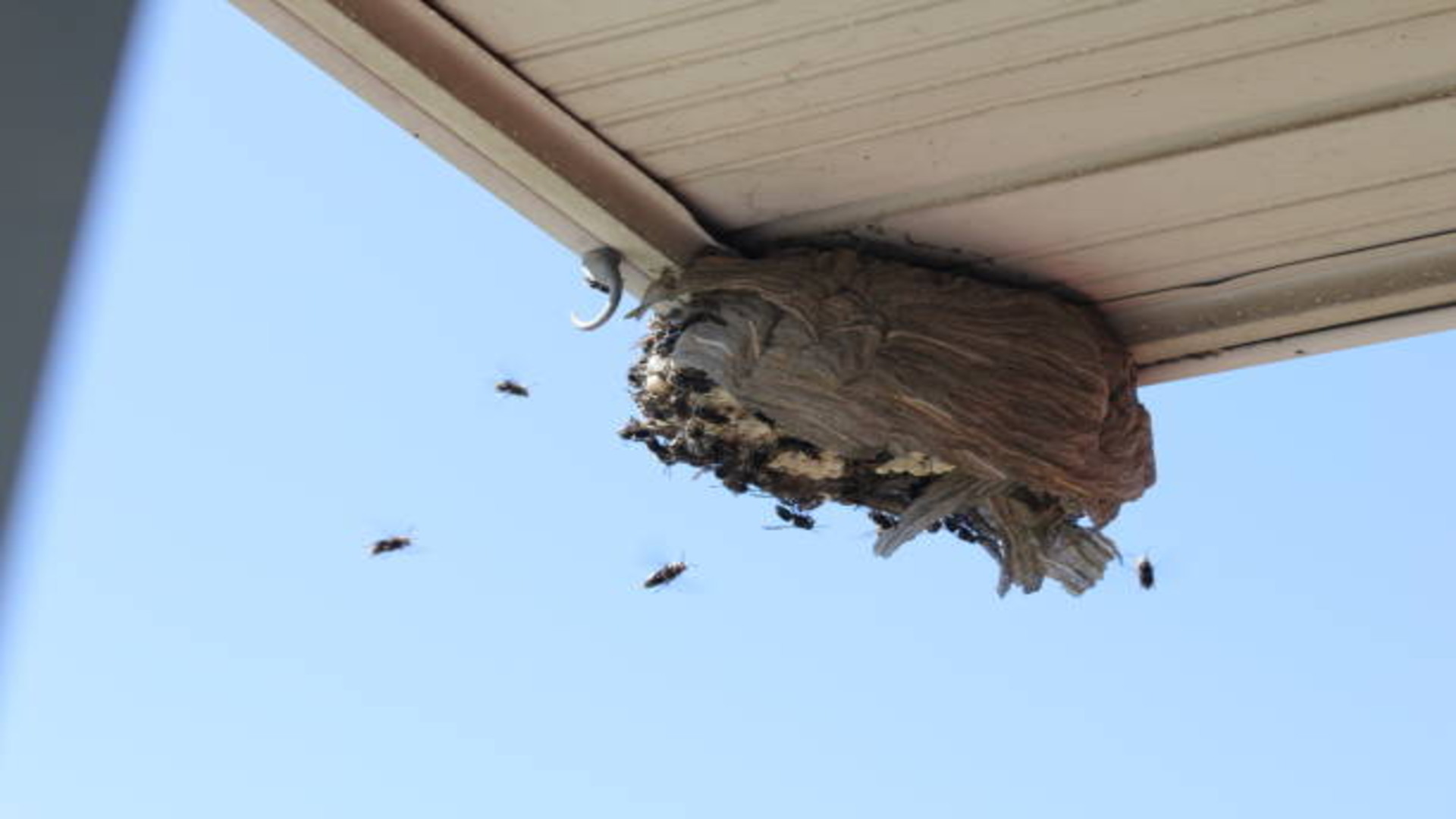 Shelter
Protected areas such as eaves, rooflines, attics, and sheds provide ideal spots for hornets to build their nests. Cracks and gaps in walls or windows can also serve as entry points for hornets looking for secure nesting locations.
Easy Prevention: Regularly inspect your home’s exterior, seal up cracks and gaps, and install screens on vents to deny hornets access.
Seasonal Activity
Hornet activity peaks in late summer and early fall when colonies reach their largest size. Hornets aren’t picky eaters. During this time, the demand for food increases, making residential areas more attractive to these insects. It’s like leaving an open fridge door for these winged intruders.
Quick Tip: Use trash bins with tight lids, empty regularly, and give your recyclables a quick rinse before disposal.
Bright Flowers and Strong Scents
Hornets share something in common with bees—they adore bright flowers and sweet scents. That lavender perfume you love? Hornets might love it too, unfortunately.
Simple Solution: Plant hornet-repelling herbs like mint or citronella, and maybe tone down the heavy fragrances when spending time outdoors.
Shelter
Protected areas such as eaves, rooflines, attics, and sheds provide ideal spots for hornets to build their nests. Cracks and gaps in walls or windows can also serve as entry points for hornets looking for secure nesting locations.
Easy Prevention: Regularly inspect your home’s exterior, seal up cracks and gaps, and install screens on vents to deny hornets access.
Seasonal Activity
Hornet activity peaks in late summer and early fall when colonies reach their largest size. Hornets aren’t picky eaters. During this time, the demand for food increases, making residential areas more attractive to these insects. It’s like leaving an open fridge door for these winged intruders.
Quick Tip: Use trash bins with tight lids, empty regularly, and give your recyclables a quick rinse before disposal.
Bright Flowers and Strong Scents
Hornets share something in common with bees—they adore bright flowers and sweet scents. That lavender perfume you love? Hornets might love it too, unfortunately.
Simple Solution: Plant hornet-repelling herbs like mint or citronella, and maybe tone down the heavy fragrances when spending time outdoors.
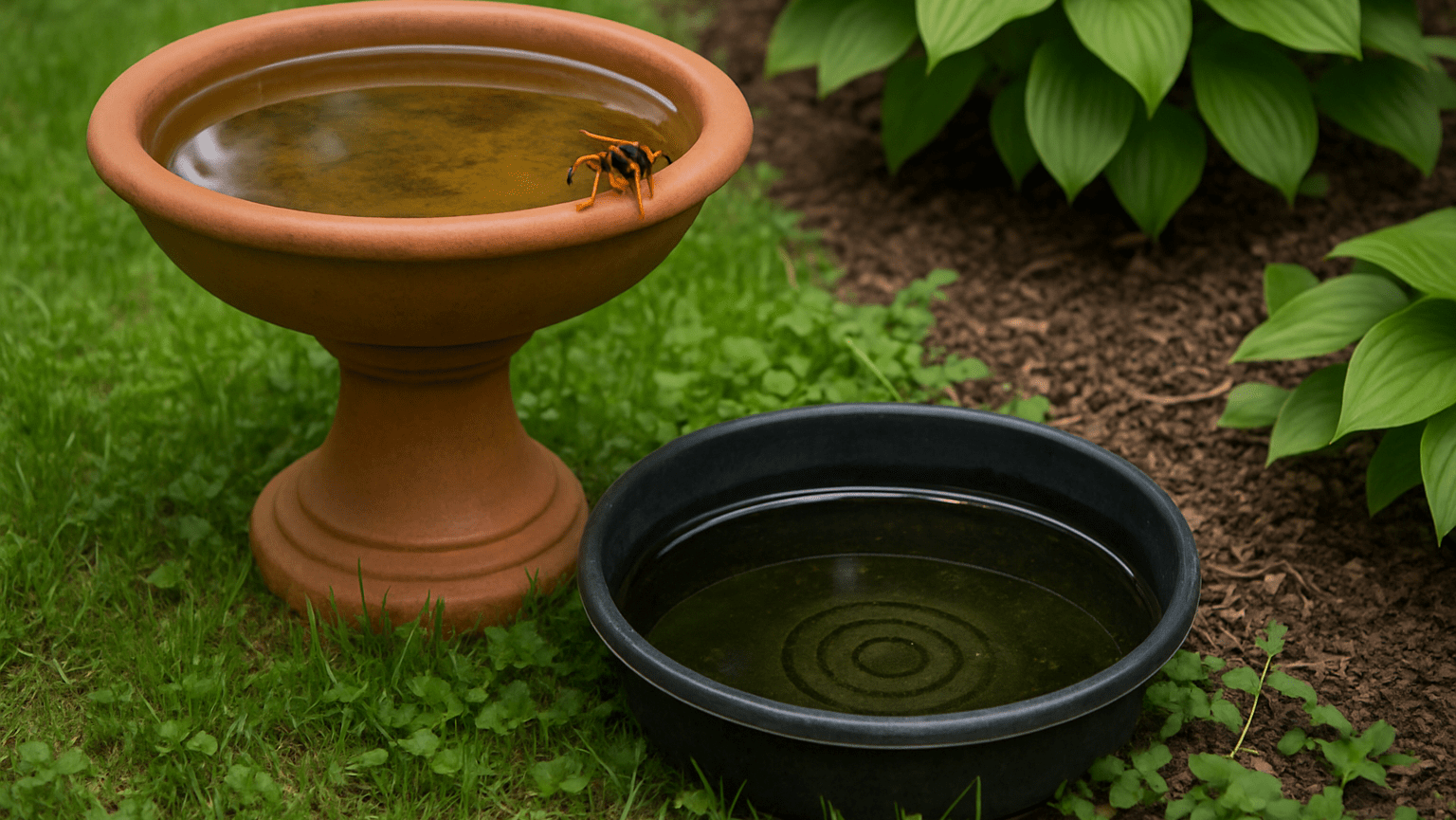 Standing Water
Hornets need water to drink and build nests, making bird baths, pet bowls, and even clogged gutters surprisingly attractive.
Here’s What You Do: Regularly empty standing water, refresh pet bowls frequently, and clean your gutters regularly.
Untreated Wood
If you’ve noticed hornets chewing on your wooden fence or deck, they’re actually gathering material for their nests. Weathered wood surfaces are particularly appealing.
Protect Your Wood: A quick coat of paint or sealant protects your wooden structures and discourages hornets from choosing your home.
Outdoor Lighting
Some hornet species, like the European hornet, are nocturnal and drawn to outdoor lights. Porch lights don’t just attract hornets directly—they attract smaller insects, providing hornets with easy prey.
Smart Lighting Tips: Limit unnecessary outdoor lights or switch to insect-repelling bulbs or motion sensors.
Visit our Species, Hornet Control, and DIY Guide sections for additional resources on hornets and ways to tackle a hornet infestation.
Standing Water
Hornets need water to drink and build nests, making bird baths, pet bowls, and even clogged gutters surprisingly attractive.
Here’s What You Do: Regularly empty standing water, refresh pet bowls frequently, and clean your gutters regularly.
Untreated Wood
If you’ve noticed hornets chewing on your wooden fence or deck, they’re actually gathering material for their nests. Weathered wood surfaces are particularly appealing.
Protect Your Wood: A quick coat of paint or sealant protects your wooden structures and discourages hornets from choosing your home.
Outdoor Lighting
Some hornet species, like the European hornet, are nocturnal and drawn to outdoor lights. Porch lights don’t just attract hornets directly—they attract smaller insects, providing hornets with easy prey.
Smart Lighting Tips: Limit unnecessary outdoor lights or switch to insect-repelling bulbs or motion sensors.
Visit our Species, Hornet Control, and DIY Guide sections for additional resources on hornets and ways to tackle a hornet infestation.
How to Gently Encourage Hornets to Move On
- Here’s a roundup of straightforward, practical ways to make your home less appealing to hornets:
-
Keep Up with Home Repairs: Seal gaps and cracks around doors, windows, and eaves to prevent hornets from building nests near or inside your home.
-
Maintain Your Yard: Trim back overgrown vegetation and remove yard clutter to eliminate hiding and nesting spots for hornets.
-
Trash Management: Secure trash bins with tight-fitting lids and manage compost responsibly to minimize food sources.
-
Try Natural Repellents: Plant mint or spray peppermint oil in common nesting zones to create a natural deterrent.
-
Spot Nests Early: Inspect your property regularly, especially in spring, to find and remove small nests before they grow.
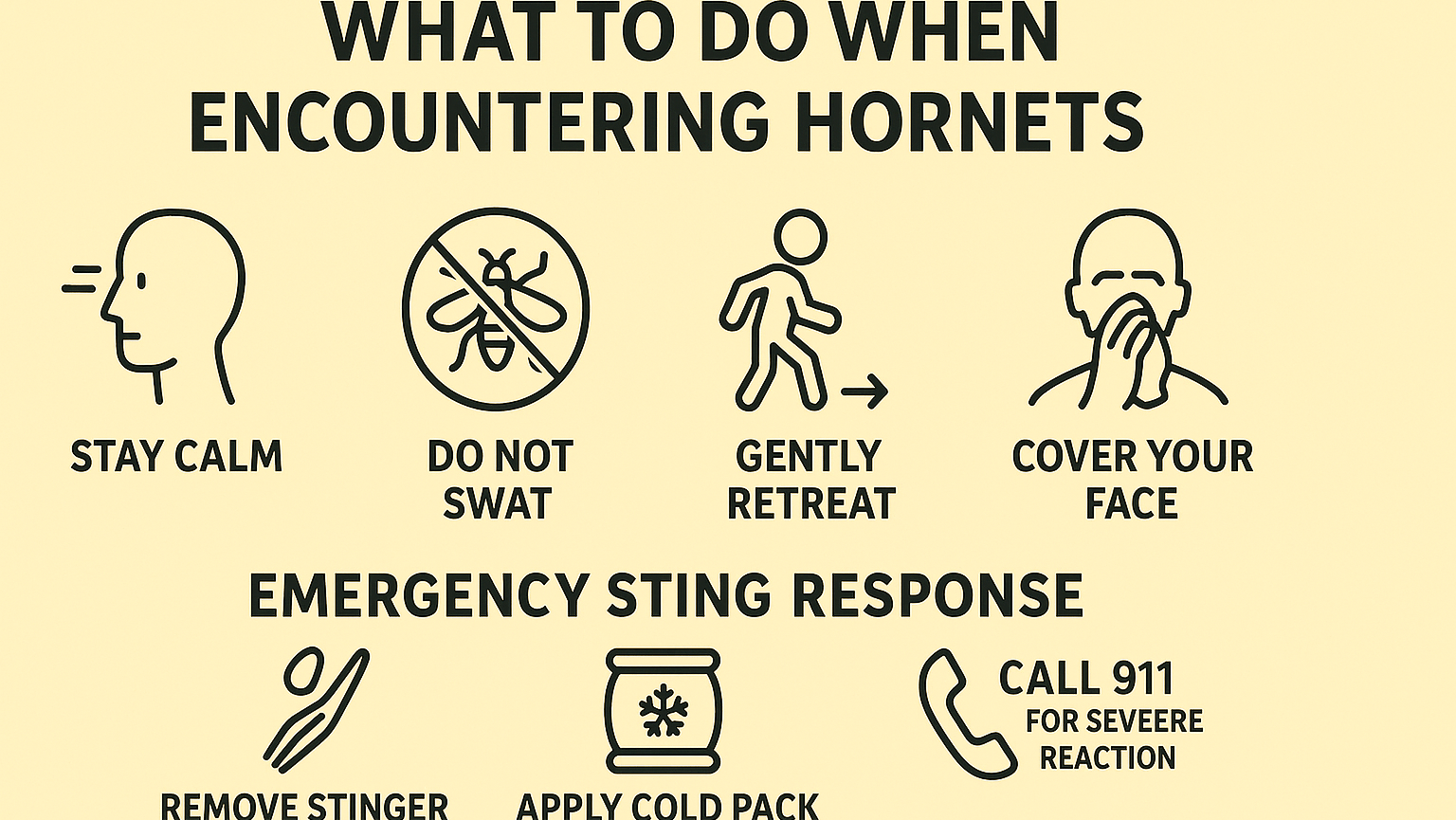
What to Do if a Hornet is in Your House?
Discovering a hornet inside your home can be unsettling, but handling the situation calmly and effectively is key to avoiding stings or escalation. Stay Calm Avoid sudden movements or attempts to swat at the hornet. This can provoke it, increasing the likelihood of an aggressive response. Secure the Area Close off doors to confine the hornet to one room, limiting its movement and making it easier to address the situation.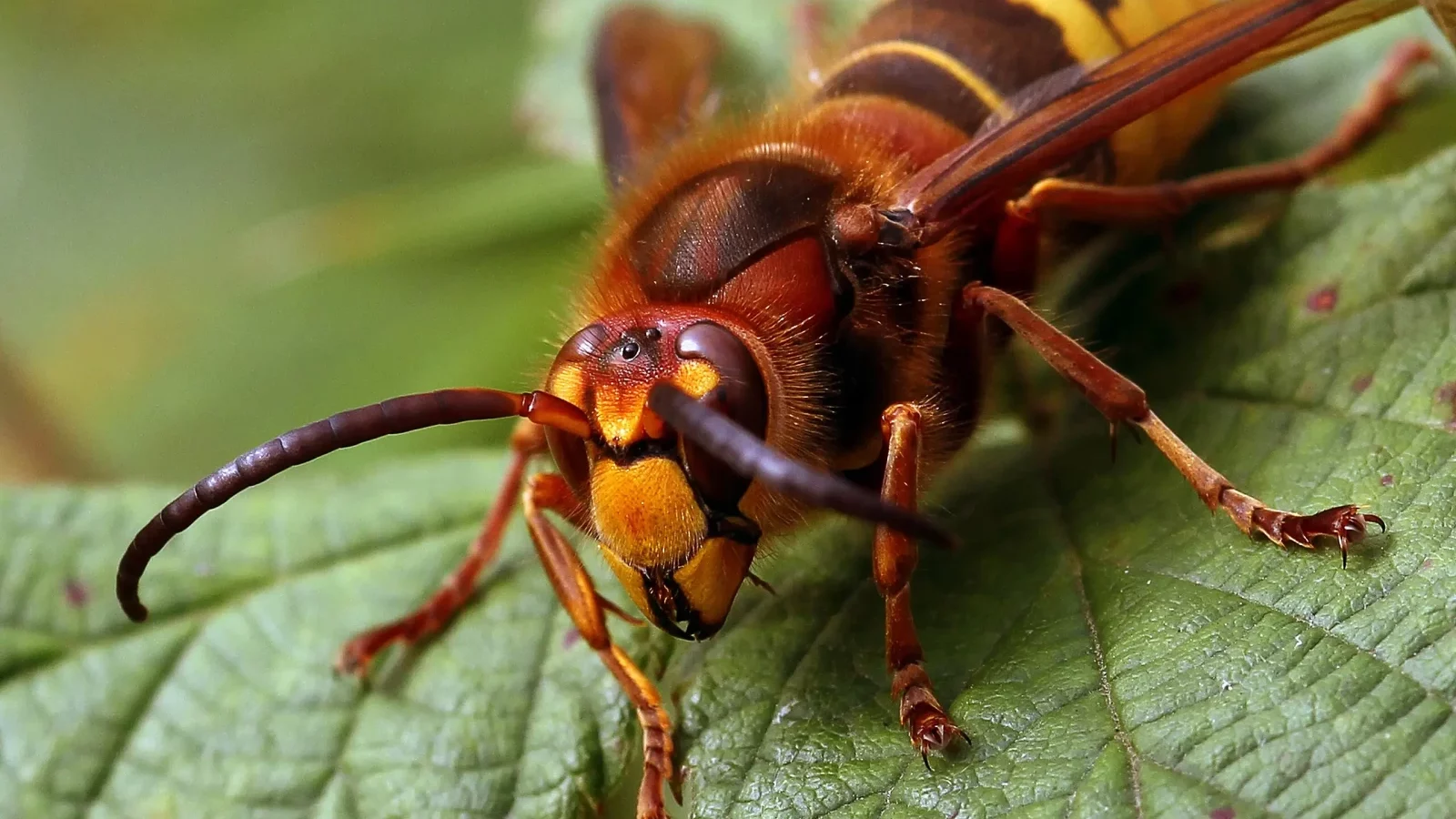 Trap and Release
Use a glass or similar container to carefully trap the hornet. Slide a piece of cardboard underneath to secure it, then release the hornet safely outside.
Call a Professional
If multiple hornets are present or you suspect a nest nearby, contact a pest control expert for safe and thorough removal.
Trap and Release
Use a glass or similar container to carefully trap the hornet. Slide a piece of cardboard underneath to secure it, then release the hornet safely outside.
Call a Professional
If multiple hornets are present or you suspect a nest nearby, contact a pest control expert for safe and thorough removal.
